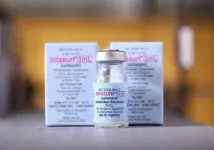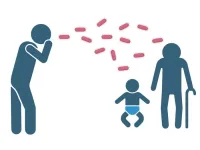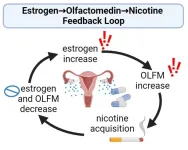(Press-News.org) As authorities crack down on illicit drugs, University of South Australia experts have issued an alert on the use of the synthetic stimulant pentylone, as new research finds a 75% increase in detections across Australia.
In a new study as part of the Australian Criminal Intelligence Commission’s National Wastewater Drug Monitoring Program, researchers identified 20 different novel psychoactive substances (NPS) in wastewater treatment plants across Australia (between Feb 22-23) with pentylone detected at every collection site. Other NPS, eutylone and phenibut were also commonly detected.
Pentylone, (street name ‘bath salts’), is a highly potent and unpredictable synthetic cathinone*, producing similar effects to stimulants such as methamphetamine or MDMA. This group of drugs produces stronger effects that wear off faster, leading to more frequent use.
Users of novel psychoactive substances are at risk due to limited information about the toxicity and unpredictable effects of these compounds.
In 2022 Australia had 1693 drug-induced deaths (64% males and 36% females).
UniSA researcher, Dr Emma Jaunay says any changes to drug levels in wastewater can provide an early warning for NPS circulating in the illicit drug market.
“Novel psychoactive substances are drugs that have been designed to mimic established illicit drugs, such as cannabis, cocaine, MDMA and LSD,” Dr Jaunay says.
“These types of drugs are unregulated and untested, and by nature their chemical composition is constantly changing to stay ahead of the law. When they first appear, they’re commonly called ‘legal highs’ because they are not yet classed as controlled or prohibited substances.
“In this study, we tested wastewater from across Australia to determine what type of NPS were being used across the year. Of the 59 different NPS we looked for, 20 were found in wastewater across the study – some occasionally, while others were at every site for multiple collections.
“The most common group of NPS detected were synthetic cathinones, also known as ‘bath salts’, which mimic the effect of stimulant drugs like MDMA.
“Specifically, we detected an increase of pentylone across Australia, with frequencies rising from 25% in April in 2022 to 100% across all states and territories by December that same year**.
“Interestingly, we found pentylone displaced eutylone, which highlights the constantly evolving nature of NPS, and how quickly drug preferences change.”
This study is unique in that the sample intentionally avoided special events and holiday periods to determine more typical trends across the year.
“Changes to drug levels present in wastewater can provide early signals about drug use and raise awareness of new drugs with harm potential,” Dr Jaunay says.
“Routine monitoring provides valuable insights about illicit drugs and their ‘legal’ counterparts before overdoses and fatalities occur.”
Notes to editors:
*Synthetic cathinones such as pentylone, eutylone and phenibut are mostly white or brown powders, but can also be in crystalline form, capsules, or tablets. They can be swallowed, snorted or injected with effects appearing within 15-45 minutes and lasting from 2-4 hours.
Additional illicit drug data here: https://www.aihw.gov.au/reports/alcohol/alcohol-tobacco-other-drugs-australia/contents/impacts/health-impacts#druginduceddeaths
…………………………………………………………………………………………………………………………
Media contact: Annabel Mansfield M: +61 479 182 489 E: Annabel.Mansfield@unisa.edu.au
UniSA researcher: Dr Emma Jaunay E: Emma.Jaunay@unisa.edu.au
END
Crackdown on illicit drugs detects rise in ‘designer’ drug substitutes
2024-03-26
ELSE PRESS RELEASES FROM THIS DATE:
Treatment for blindness-causing retinal detachment using viscous seaweed
2024-03-26
It’s taboo to consume seaweed soup before exams in Korea since it can lead to failing the exam. The belief is rooted in the idea that the slippery nature of seaweed may cause people to slip and falter during the test. The slick surface of seaweeds such as seaweed and kelp is attributed to alginate, a mucilaginous substance. Notably, an intriguing study exploring the use of alginate for the treatment of retinal detachment has been recently published.
A collaborative effort between Professor Hyung Joon Cha from the Department of Chemical Engineering and the School of Convergence Science and Technology and Dr. Geunho Choi from ...
More needs to be done for depressed stroke survivors as incidence climbs
2024-03-26
Researchers say more needs to be done for depressed stroke survivors as new findings show 60% of stroke survivors would experience depression within 18 years, a much higher estimation than previous studies.
This compares to 22% of the general population experiencing depression in the same time frame.
The King’s College London study, published today in The Lancet Regional Health – Europe, also found 90% of cases of depression occurred within five years of surviving a stroke, indicating a key time for healthcare intervention.
The findings, funded by the National Institute for Health and Care Research, looks at incidence of mild ...
Research lights up process for turning CO2 into sustainable fuel
2024-03-26
Researchers have successfully transformed CO2 into methanol by shining sunlight on single atoms of copper deposited on a light-activated material, a discovery that paves the way for creating new green fuels.
An international team of researchers from the University of Nottingham's School of Chemistry, University of Birmingham, University of Queensland and University of Ulm have designed a material, made up of copper anchored on nanocrystalline carbon nitride. The copper atoms are nested ...
Essays on democracy draw attention to critical threats, explore safeguards ahead of Jan. 6
2024-03-25
Following the events of Jan. 6, 2021 — when a violent mob stormed the U.S. Capitol building in an effort to interrupt the certification process of the 2020 presidential election — experts began to question how to protect the next presidential election from a similar threat. To that end, University of Notre Dame political scientists have partnered with preeminent scholars of democracy from across the country to produce a set of recommendations to strengthen and safeguard democracy in America.
The University’s Rooney Center for the Study of American Democracy established the January 6th, ...
New surfactant could improve lung treatments for premature babies
2024-03-25
Scientists have developed a new lung surfactant that is produced synthetically rather than relying on the use of animal tissues. With further development, the formulation could provide a cheaper and more readily available alternative to Infasurf, a medication used to prevent and treat respiratory distress in premature babies.
Surfactants are substances that decrease surface tension where liquids interface with other liquids, gases or solids. In addition to their use in medicines, they are found in a wide range of products including detergents, cosmetics, motor oils and adhesives.
Suzanne Farver Lukjan, a lecturer in chemistry ...
Researchers uncover key biomolecule involved in whooping cough infection
2024-03-25
Researchers have identified a new complex-carbohydrate biomolecule, or glycan, that plays a key role in the nasal colonization of the Bordetella bacteria responsible for whooping cough. The discovery could make it possible to create a new drug or vaccine that interferes with the glycan to greatly reduce or even stop ongoing Bordetella transmission.
Bordetella pertussis is the cause of the respiratory infection pertussis, which is widely known as whooping cough. Today’s pertussis vaccines keep people from getting severely sick, but they don’t eliminate the bacteria because it excels at colonizing, ...
Study links long-term consumption of reused deep-fried oil with increased neurodegeneration
2024-03-25
A new study found higher levels of neurodegeneration in rats that consumed reused deep fried cooking oils and their offspring compared to rats on a normal diet. Deep frying, which involves completely submerging food in hot oil, is a common method of food preparation around the world.
Results from the study also suggest that the increased neurodegeneration is tied to the oil’s effects on the bidirectional communication network between the liver, gut and brain. The liver–gut–brain axis plays a crucial role in regulating various physiological functions, and its dysregulation has been ...
Study suggests statins could help fight gum disease
2024-03-25
Could taking statins benefit your mouth in addition to your arteries? A new study conducted in cell cultures showed that cholesterol-lowering drugs help to dampen the inflammation associated with periodontal disease by altering the behavior of macrophages, a type of immune cell.
Statins are the most common type of prescription medication in the United States today, taken by over 40 million Americans to lower cholesterol. The study suggests these drugs improve gum health and reduce the risk of heart disease.
Subramanya Pandruvada, an assistant professor in the College ...
Study suggests that estrogen may drive nicotine addiction in women
2024-03-25
A newly discovered feedback loop involving estrogen may explain why women might become dependent on nicotine more quickly and with less nicotine exposure than men. The research could lead to new treatments for women who are having trouble quitting nicotine-containing products such as cigarettes.
Sally Pauss is a doctoral student at the University of Kentucky College of Medicine in Lexington. She led the project.
“Studies show that women have a higher propensity to develop addiction to nicotine than men and are less successful at quitting,” said Pauss, ...
The complexities of lung cancer screening decisions among patients with comorbidities
2024-03-25
Many individuals eligible for lung cancer screening (LCS) also suffer from multiple health issues at the same time, known as comorbid conditions. This study explores how primary care physicians (PCPs) factor comorbidities into their shared decision-making conversations with patients to discuss the harms and benefits of lung cancer screening. Researchers conducted semi-structured interviews with 15 PCPs affiliated with the Mount Sinai Health System in New York City between October 2020 and February 2021. PCPs were asked questions to examine their understanding of how comorbidities ...






